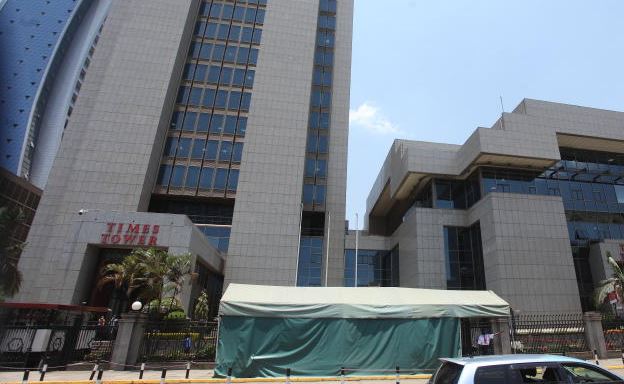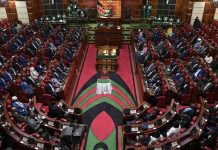AfricaPress-Kenya: President Uhuru Kenyatta’s grand dream of boosting the manufacturing sector to create millions of jobs for unemployed youth seems to be in shambles.
And now his administration wants out of the plan to support local manufacturing firms with a mixture of tax incentives, low tariffs and bailouts because they have become dead weight.
Several studies have shown that these companies have not increased investments, exports or jobs despite enjoying the tax breaks.
Already, the National Treasury has rolled back several tax holidays enjoyed by some of the firms, including those in the Export Processing Zones (EPZ) after it became apparent that taxpayers were getting a raw deal.
A study commissioned by the Kenya Revenue Authority (KRA) on the economic impact and benefit of the incentives, found that the country lost about Sh216.9 billion between 2014 and 2019 from tax breaks.Read More
- 1 Taxpayers to enjoy relief on undisclosed taxes
- 2 2020: The key numbers that defined Kenya’s toughest year
- 3 Tough start for Kenyans in 2021 as MPs vote for higher taxes
- 4 City families, traders to pay more to finance Sh37b budget
Most of these tax holidays did not translate to increased economic growth.
In an interview last year, National Treasury Cabinet Secretary Ukur Yatani said the decision to reverse some of the tax incentives was reached after realising that the benefits were not being passed on to the ordinary mwananchi.
“You just balloon their profits and they are not going to the citizens,” he said.
The World Bank also wants the government to stop pampering non-productive manufacturing firms, noting in a recent study that the country’s policies have inadvertently supported inefficient companies.
According to the bank’s Systematic Country Diagnostic report, not only have these companies been less productive than those in the service sector, but they have also performed dismally compared to their peers in Ethiopia and Ghana.
“This indicates the potential for the existence of policies that favour the survival of inefficient firms in the manufacturing sector more than in the services sector, which suggests that resource misallocation is greater in manufacturing than in services,” read the report.
The study also compared the efficiency of Kenyan manufacturers with those in China and India, major competitors for Kenyan firms operating in the global market.
These inefficient local manufacturers have continued to absorb billions in tax exemptions.
This is money that would have been used to provide key public services such as education, health, security, water and sanitation.
Local manufacturers, through the Kenya Association of Manufacturers (KAM), insist the government’s support has been half-hearted; that the government has given with one hand and taken with the other by, for instance, introducing policies such as minimum tax, and dithering in actualising its policies.
Country’s competitiveness
They argue that this has made Kenyan firms uncompetitive, a fact that was emphasised by Kiprono Kittony, the chairman of Nairobi Securities Exchange, who argued that if nothing is done to improve the country’s competitiveness, the situation will only get worse.
“It is estimated that Kenya is 12.8 per cent uncompetitive in relative to other countries in the region,” said KAM in a statement.
The lobby noted that at times, the actualisation of the State’s incentives takes too long. “For instance, guidelines needed to offer the incentives are sometimes not developed at the time the incentive is pronounced.”
Support of inefficient local manufacturers, experts say, has also translated into high cost of living for consumers who pay high prices for products such as sugar, as the government fails to pull the plug on insolvent millers.
For long, time Kenya has supported local manufacturers through a combination of tax holidays and tariffs. This help went a notch higher in 2018 when President Kenyatta unveiled the Big Four Agenda.
One of the pillars of the agenda is increasing value-addition to create jobs and increase income.
In June 2018, then Treasury CS Henry Rotich introduced punitive duties on imported iron and steel, paper and paperboards, vegetable oils and timber to shield local manufacturers from ‘unfair’ competition.
Three years later, the strategy seems to have backfired. Despite the increase in duties, official data shows that the inflow of steel, vegetable oils and secondhand clothes has surged.
KAM gives three reasons for the uptick in imports. First is that much of local manufacturing, about 80 per cent, is dependent on imported raw materials.
“For example, steel is produced from iron ore. Kenya is yet to exploit iron ore deposits in the country and billets must be imported,” said KAM in the statement.
In the case of edible oils, KAM said, crude palm oil is the main raw material used in the processing and it is imported from Malaysia and Indonesia. The second reason why imports have skyrocketed despite the tariffs is that a lot of manufactured imports coming into Kenya originate from Egypt, a member of the Common Market for Eastern and Southern Africa (Comesa).
Kenya is also a member of Comesa, a free trade area with 21 member states.
“Imported goods from the bloc do not attract import duty. In such an instance, tariff protection will not work,” said KAM.
The third reason, it said, was that there have been instances of illicit trade into the country in the form of under-invoiced or mis-declared goods.
Nonetheless, three years later, the contribution of manufacturing as a fraction of total gross domestic product (GDP), or total economic output, has shrunk to around seven per cent.
The goal was to raise it from around nine per cent in 2016 to 15 per cent by 2022.
This, the government reckoned, would add between Sh218 billion and Sh327 billion to GDP and increase manufacturing jobs by more than 800,000 annually.
Meanwhile, taxpayers continue to prop up these companies by foregoing billions of shillings in taxes that would be used to provide critical services such as education, healthcare and security.
Billions have been poured into some manufacturing companies where the government has a stake, with the sugar sector among the worst performing.
Nzoia Sugar’s liabilities, for instance, exceed its assets by Sh45 billion.
Muhoroni Sugar, which is in receivership, has liabilities that exceed its assets by Sh28 billion, Chemelil Sugar’s by Sh2.8 billion and South Nyanza Sugar Company by Sh2.7 billion.
Mumias Sugar, which is under administration, is another sugar miller that has been absorbing taxpayer cash in bailouts only for it to sink further into debt.
Despite being a member of Comesa, Kenya has continued to shield its sugar companies from competition.
Several times, the government has requested and received extensions of safeguards that have restricted the inflow of sugar from the trade bloc.
Kenya’s argument has been that its sugar industry needs more time to become more competitive against Comesa peers such as Mauritius.
But this protection, according to a 2018 study by three international organisations, has come at the expense of both consumers and producers.
The study by the International Monetary Fund, the World Bank and World Trade Organisation noted that lack of competition in the market due to State protection of moribund sugar millers had seen consumers pay high prices for the sweetener, even as farmers received peanuts for their produce.
Open system
Relaxing trade barriers, according to a World Bank report, would allow sugar prices to fall by 20 per cent and could reduce poverty by 1.5 per cent.
Gerishon Ikiara, an economist and former Transport Permanent Secretary, says overprotection from competition makes local companies inefficient.
“A strategy of trying to industrialise through protection won’t work,” he said, citing the failure of import substitution in the ‘80s and ‘90s.
“The best thing is having a very open system to allow manufacturers, even from outside; creating an environment for people who want to invest in Kenya.”
After a breakdown of global supply chains following the outbreak of Covid-19, most countries have toyed with the idea of reverting to import substitution to revamp their own industries in case such a crisis strikes again.
Even as the KRA study recommended the phasing out of what it described as “redundant tax incentives,” KAM is calling for a favourable tax regime as a means to give manufacturers a fair and equal chance to thrive in the country.
“Where incentives are provided alongside government policies that seek to increase taxes, the outcome is a zero-sum game for both government and local industries,” KAM said.






